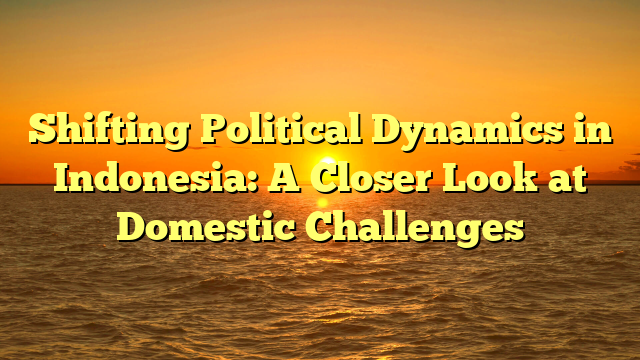Indonesia, the world’s third-largest democracy, has long been celebrated for its political resilience and commitment to democratic principles since the fall of the New Order regime in 1998. However, the country’s domestic political landscape is far from static. Over the past few years, shifts Pattimura4d in public opinion, rising economic pressures, and deepening political polarization have altered the way governance and policymaking function in the nation.
One of the most prominent features of Indonesia’s recent political climate is the consolidation of power within broad coalition governments. While such arrangements aim to create stability, they often blur ideological distinctions between parties, making it difficult for voters to clearly identify policy differences. This “all-inclusive” approach to governance has been criticized for weakening the role of opposition parties, which are essential in holding the government accountable and fostering healthy democratic debate.
The influence of social media on politics has also intensified. Platforms like Twitter, Instagram, and TikTok have become arenas for political campaigning, opinion shaping, and sometimes, disinformation. While these platforms can empower citizens and encourage civic engagement, they also present challenges in ensuring fact-based public discourse. The rapid spread of unverified information can deepen divisions and erode trust in institutions, especially during election periods.
Another pressing domestic issue is the relationship between central and regional governments. Indonesia’s decentralization reforms, implemented in the early 2000s, granted significant autonomy to local governments. While this has allowed for more localized decision-making, it has also created disparities in policy implementation and governance standards across regions. Corruption cases at the regional level continue to emerge, highlighting the need for stronger oversight and transparency measures.
Economic concerns remain deeply intertwined with political stability. Rising living costs, unemployment, and uneven economic development across provinces have become focal points in political debates. The government’s efforts to attract foreign investment and promote infrastructure development are commendable, but critics argue that these projects must be balanced with environmental sustainability and the protection of local communities. Political leaders are increasingly judged not just on their rhetoric, but on their ability to deliver tangible improvements to citizens’ lives.
The upcoming electoral cycle is expected to test the resilience of Indonesia’s democratic institutions. Political parties are already mobilizing support through both traditional grassroots campaigning and digital outreach. Younger voters, who make up a significant portion of the electorate, are demanding greater transparency, inclusivity, and policy innovation. Their influence could reshape political priorities, pushing leaders to address issues such as climate change, education reform, and digital economy development.
Civil society organizations continue to play a crucial role in safeguarding democratic norms. From monitoring elections to advocating for human rights and anti-corruption measures, these groups often serve as a counterbalance to state power. However, the shrinking space for dissent in certain areas—marked by the use of legal tools against activists and journalists—has raised concerns about the health of democratic freedoms.
In conclusion, Indonesia’s domestic political scene is in a period of transition, shaped by both long-standing challenges and emerging trends. The balance between stability and accountability, the management of digital influence, and the pursuit of equitable economic growth will be central to determining the country’s political trajectory in the coming years. As Indonesia moves toward its next chapter, the choices made by its leaders—and the engagement of its citizens—will define the quality and strength of its democracy.
